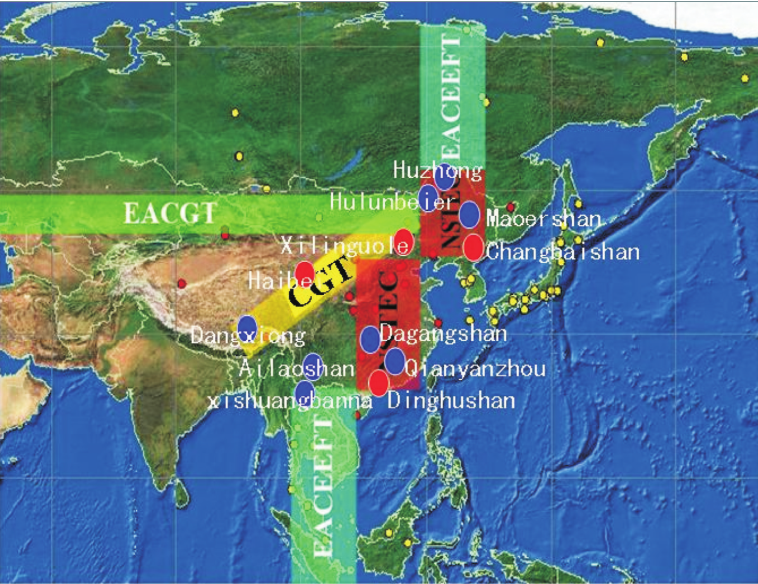Ecology has been recognized as an independent discipline since 1869, when Ernest Haeckel first used this terminology and defines it as a branch of science for studying the interactions between organisms and their environment. The modern ecology expanded the subject and scope of the study; broke throw the limitation of pure naturalism tendency and was actively involved in solving the urgent task of world-concerned global development problem. While equipped by modern methodology and equipments, it becomes a bridge between science and development. Although a wealth of knowledge with deep ecological thought has been accumulated in the long course of China’s development, it has not developed into a science until the 1950s. The development of ecology in China may roughly be divided into four phases (i.e. primitive embryonic phase, fundamental ecological study phase, ecosystem study phase, and the phase for sustainable development. This paper gives a general review of the development of ecology in China and introduced the progress in several selected areas. These include: biodiversity conservation, ecological research related to global change, restoration of degraded ecosystems, desertification control, ecosystem study on the Qinghai-Tibetan Plateau, promotion of sustainable development from concept to action, and evaluation of ecosystem services and eco-compensation, etc. Based on the current development status of ecological science in China and the needs of the country, six priority areas for development of Ecology in the future were recommended.

Costanza R, et al. 1997. The value of the world's ecosystems services and natural capital. Nature, 387:253–260.
Chen C D. 1998. China's biodiversity: a country study. Beijing: China Environmental Science Press.
Chen L Z, Wang X P, Wang S. 1993. Biodiversity in China. Beijing: Scinece Press.
Ci L J, Wu B. 1997. Climatic type division and the potential extent determination of desertification in China. Journal of Desert Research, 17(2): 107–112.
Daily G. 1997. Natures Service: Social Dependence on Natural ecosystems. Washengton DC: Island Press.
Fan C Y. 1983. Some outstanding Works on Agriculture. In: Ancient China Technology and Science. Beijing: Foreign Language Press.
Fang J Y, Chen A P, Peng C H, et al. 2001. Changes in forest biomass carbon storage in China between 1949 and 1998. Science, 292:2320–2322.
Feng Z W, Wang X K, Wu G. 1999. The Biomass and Productivity of forest ecosystem in China. Beijing: Science Press.
Hou X Y. 2001. The vegetation atlas of China (1:1,000,000).Beijing: Science Press.
Hou X Y. 1983. Vegetation of China with reference to its geographical distribution. Annals of the Missouri Botanical Garden, 70:509–548.
Jiao J R, Shi L R, Niu C H, et al. 2006. On target of soil and water conservation in “the eleventh years” period of China. Science of Soil and Water Conservation, 4(4):1–5.
Li W H, Ouyang Z Y, Zhao J Z. 2002. Studies on Ecosystem Services. Beijing: Meteorological Press.
Li W H, Zhou X M. 1998. Ecosystems of Qinghai-Xizang(Tibetan) Plateau and approach for their sustainable management. Guangzhou: Guangdong Science & Technology Press.
Li W H. 2001. Agro-ecological Farming Systems in China. Nashville, TN, USA: Parthenon Publishing.
Li W H. 2003. Eco-agriculture — Theories and Practices of Sustainable Agriculture in China. Beijing: Chemical Industry Press.
Liu D S. 1981. Geological and ecological studies of Qinghai-Xizang Plateau. Beijing: Science Press.
Lu Q, Yang Y L, Wang S, et al. 2004. The Revelation: Combating Desertification in China. Beijing: Science Press.
Ma S J, Wang R S. 1984. The Social-Economic-Natural Complex Ecosystem. Acta Ecologica Sinica, 4(1): 1–9.
Min Q W. 2009. Dynamic Conservation and Adaptive Management of China's GIAHS: Theories and Practices. Beijing: China Environmental Science Press.
Piao S L, Fang J Y, P Ciais, et al. 2009. The carbon balance of terrestrial ecosystems in China. Nature, 458:1009–1013.
Task Force on Eco-compensation Mechanism and Policies, CCICED. 2007. Eco-Compensation mechanisms and policies in China. Beijing: Science Press.
Wang T, Zhao H L. 2005. Fifty-year History of China Desert Science. Journal of Desert Research, 25(3):153–157.
Yu G R. 2006. Carbon exchange research in ChinaFLUX. Agricultural and Forest Meteorology, 137:123–124.
Yu G R. 2003. Global change, carbon cycle and storage in terrestrial ecosystem. Beijing: Meteorological Press.
Zhang X S, Yang D A. 1995. Allocation and study on global change transects in China. Quaternary Sciences, (1):1–4.
Zhu L K. 2006. Dynamics of desertification and sandification in China. Beijing: China Agricultural Press.


